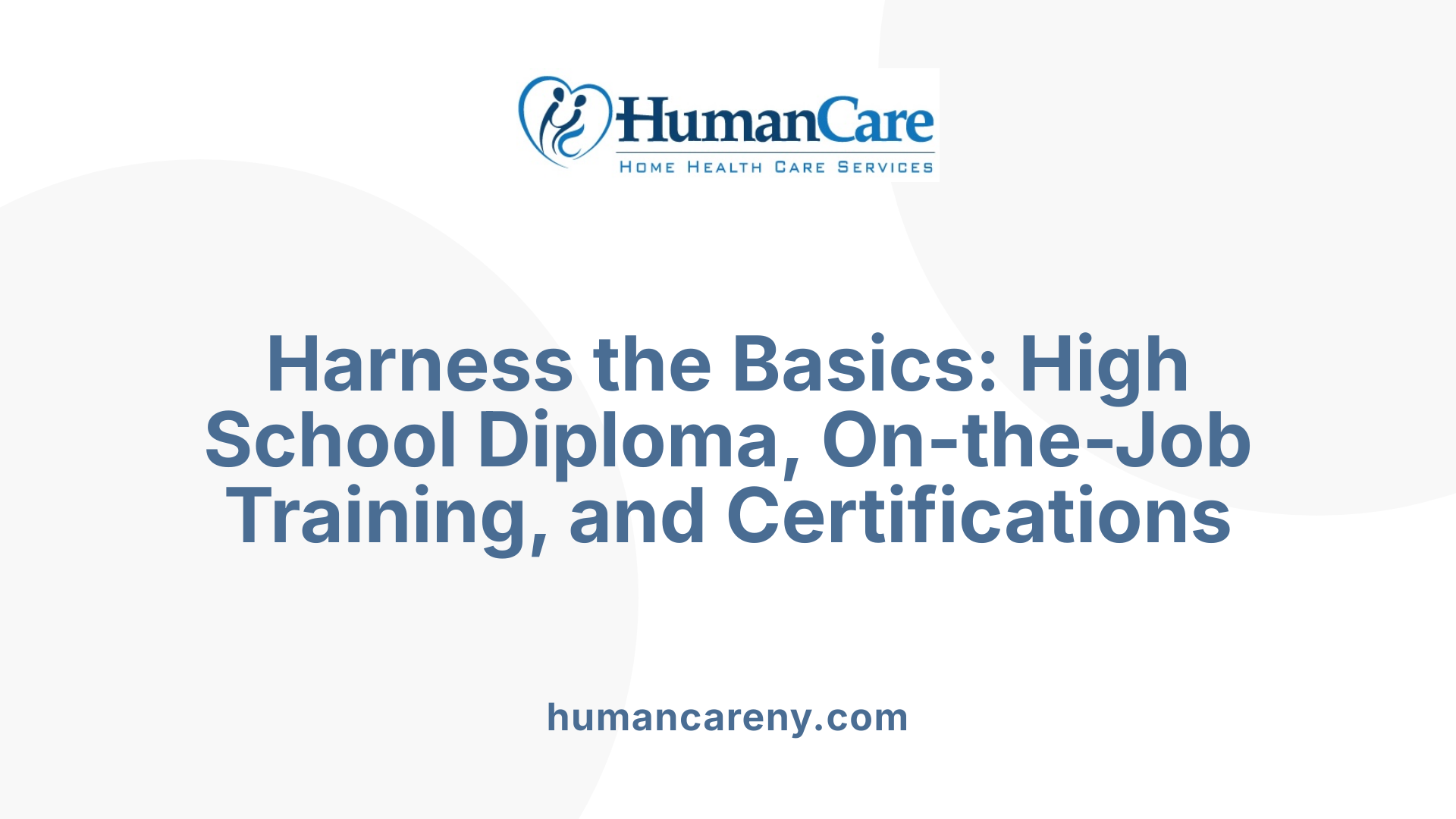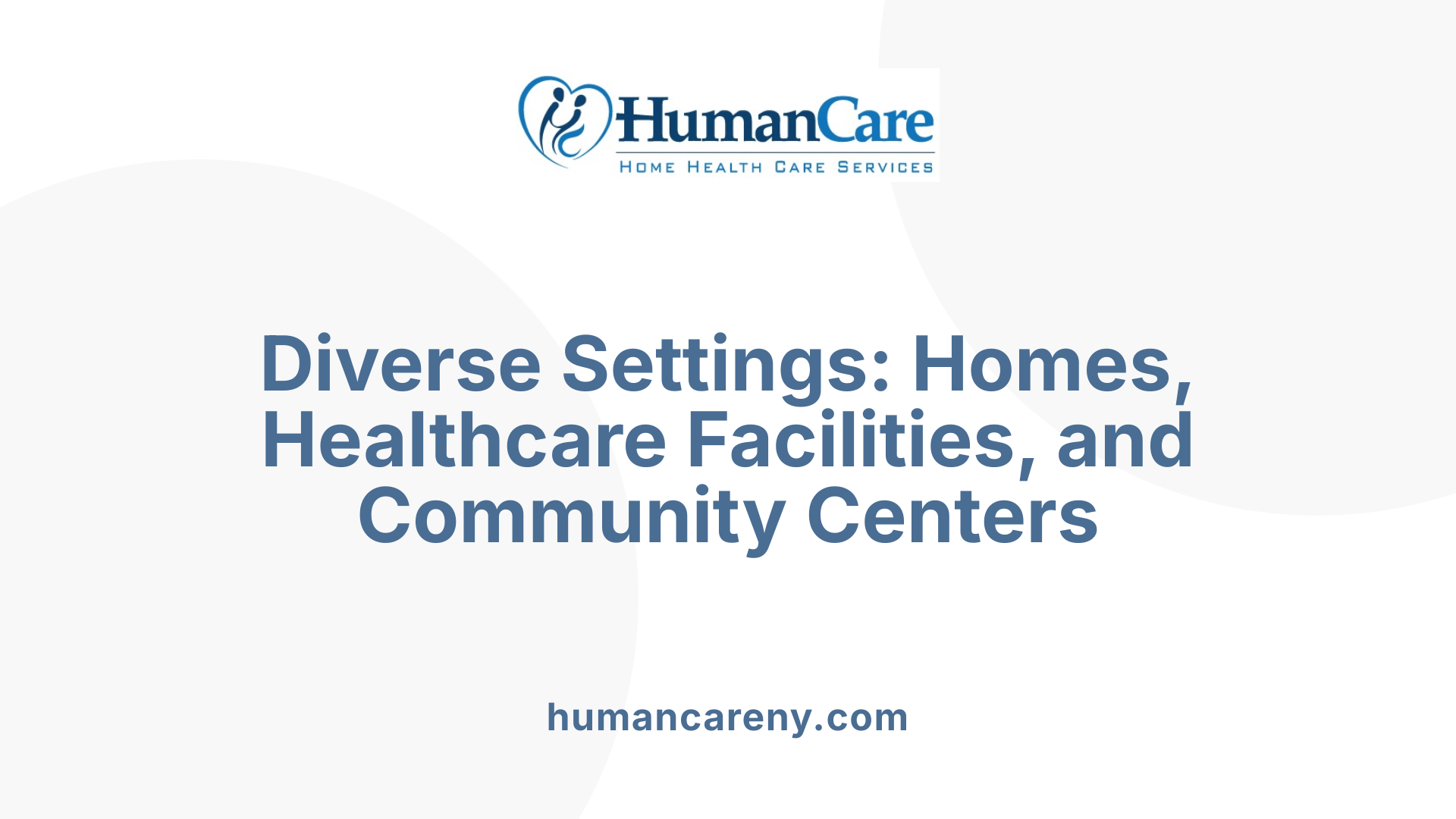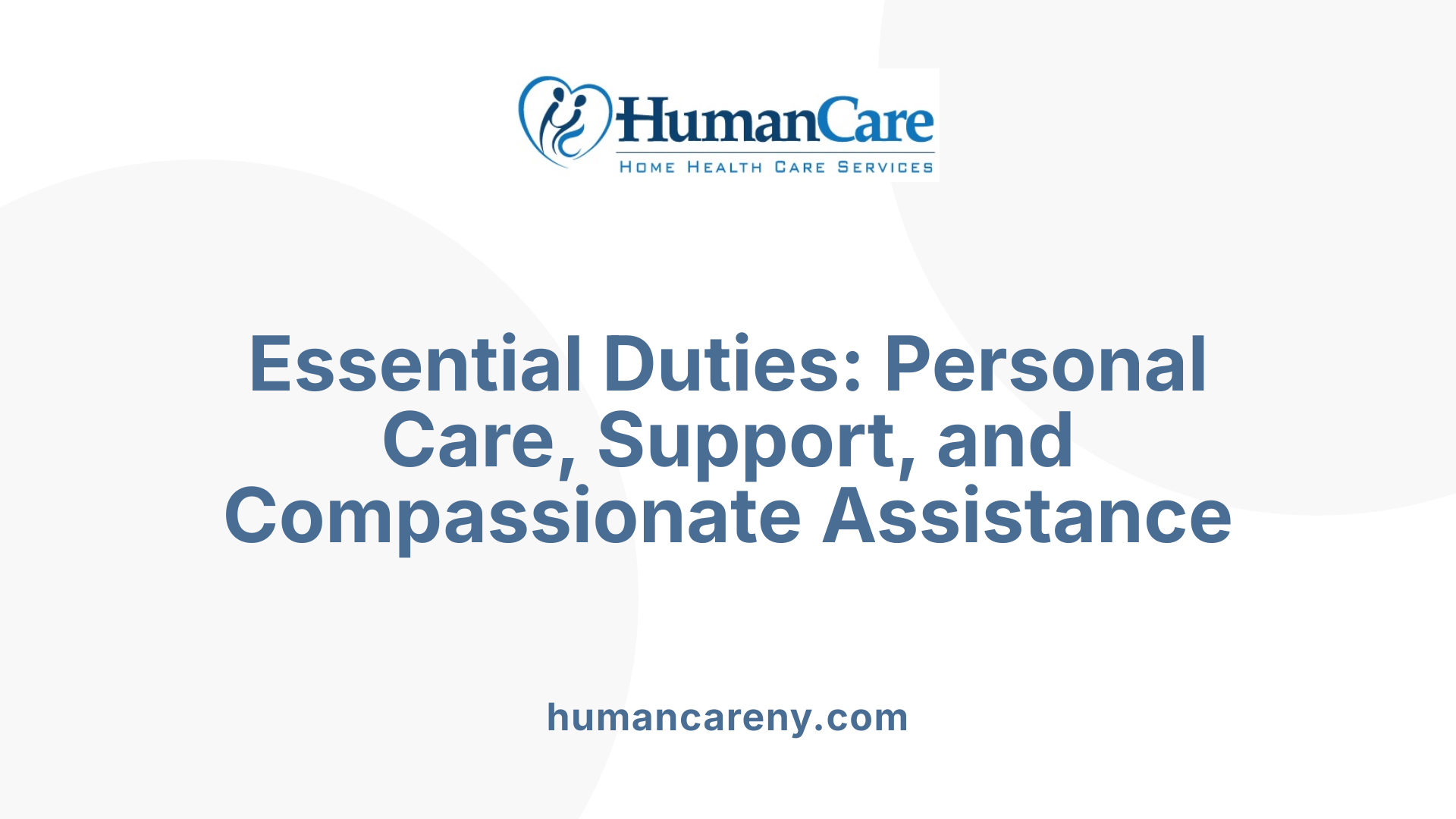Bridging the Gap: The Vital Role of Personal Care Aides
Personal care aides (PCAs) play an indispensable role in the healthcare ecosystem by providing personalized assistance that promotes independence, safety, and well-being for individuals with disabilities, chronic illnesses, or age-related challenges. Their work primarily centers on supporting clients with daily activities and ensuring they can live comfortably within their homes or care facilities. As our aging population grows and healthcare models shift toward more community-based care, understanding the scope and significance of personal care aides becomes essential for families, policymakers, and healthcare professionals alike.
Defining and Understanding Personal Care Aides
What are personal care aides and what do they do?
Personal care aides (PCAs) are compassionate professionals trained to assist individuals with daily living activities that help them live comfortably and safely. Their primary focus is on supporting clients in tasks such as bathing, dressing, grooming, and mobility. Instead of providing medical treatments, they concentrate on non-medical support, emphasizing dignity and independence.
PCAs work in diverse environments, including personal residences, assisted living setups, nursing homes, and hospitals. Besides helping with daily care routines, they assist with household chores like light cleaning, laundry, and meal preparation, considering any dietary restrictions. They also help clients with medication reminders, ensuring they adhere to prescribed regimens without administering medications themselves.
A typical pathway to becoming a PCA involves completing a high school diploma or GED, followed by on-the-job training. Certifications such as CPR and first aid are highly recommended and sometimes required to verify their ability to respond effectively in emergencies.
In addition to performing physical activities, PCAs play a crucial role in emotional support. They build trust and companionship, which can significantly enhance the client’s mental health. Often, they work closely with healthcare teams and family members to develop and update personalized care plans that meet the evolving needs of clients.
Their work is vital for individuals with disabilities, aging adults, or those dealing with chronic illnesses, as it promotes independence while ensuring safety and well-being. Through their supportive care, personal care aides help improve the quality of life for those they serve, fostering a more comfortable and dignified living environment.
Core Skills and Personal Traits for Success

What skills and traits are necessary for personal care aides?
Personal care aides need a blend of compassionate and respectful qualities to build trusting relationships with their clients. Empathy and patience are fundamental, as they often care for individuals experiencing physical or emotional challenges.
Strong communication skills are crucial. Aides must convey information clearly to clients, families, and healthcare teams, and also listen carefully to understand clients' needs and concerns.
Attention to detail enables aides to monitor health status effectively, such as checking vital signs and recognizing subtle changes in a client’s condition that might require medical attention.
Physical strength, stamina, and coordination are essential for assisting with daily activities like transferring, mobility, or personal hygiene tasks safely.
Adaptability and organization help aides follow evolving care plans, coordinate tasks, and respond flexibly to unexpected situations.
Cultural sensitivity and professionalism enhance the quality of care, ensuring respect for diverse backgrounds and fostering positive interactions.
Learning agility and problem-solving skills enable aides to handle new challenges and maintain high standards of care, often through ongoing training.
Overall, successful personal care aides combine technical skills with compassionate personal traits to provide high-quality, dignified support for those in their care.
Qualifications, Training, and Certification Pathways

What qualifications and training are required to become a personal care aide?
To pursue a career as a personal care aide, individuals generally need to hold at least a high school diploma or GED. This basic educational requirement ensures candidates have fundamental skills in reading, writing, and math, which are necessary for understanding care plans and communicating with clients and healthcare teams.
Most of the training for personal care aides is conducted on the job. During this phase, new aides learn essential skills such as infection control, safety procedures, basic nutrition, and emergency response protocols. Employers and supervising registered nurses typically provide ongoing instruction and oversight to ensure new aides develop the competency needed for their roles.
Many states also require formal certification or training before entering the workforce. This process often includes passing a background check to ensure trustworthiness and safety. Candidates usually demonstrate their competence by passing a competency exam that tests their understanding of essential caregiving tasks.
Specifically, federal regulations mandate that home health aides, who often perform similar roles, complete at least 75 hours of training. This training encompasses a wide range of topics, including personal care skills, emergency procedures, and basic healthcare knowledge.
Certifications such as CPR (Cardiopulmonary Resuscitation) and First Aid are highly advantageous for personal care aides. While not always mandatory, they enhance an aide’s employability and preparedness to respond to emergencies.
For those interested in career growth, obtaining additional qualifications like an associate or bachelor’s degree in health sciences can open doors to supervisory roles or specialized care fields.
Training standards and certification requirements can vary significantly by state. Some states have more comprehensive training and certification processes, whereas others may have minimal requirements. Recognizing this, there is an ongoing movement toward standardizing qualifications across states to ensure a consistent level of care and facilitate interstate work mobility.
In summary, becoming a personal care aide generally involves obtaining a high school diploma or equivalent, completing on-the-job training, and acquiring relevant certifications. These foundational steps help prepare aides to deliver safe, compassionate, and competent care to those in need.
Work Environments and Settings for Personal Care Aides

In what environments do personal care aides work?
Personal care aides provide essential support to individuals in a wide range of settings tailored to meet their needs. They typically operate within private homes, where they assist clients with daily activities and provide companionship. These settings often include the homes of elderly or disabled individuals, where aides help with bathing, dressing, and mobility to promote independence.
Beyond private residences, personal care aides also work in more structured environments such as assisted living facilities, nursing homes, and hospitals. In these institutions, they collaborate with medical professionals to ensure residents or patients receive comprehensive care. Hospice centers and adult daycare centers are additional settings, focusing on comfort and social engagement for individuals with advanced illnesses or those requiring daytime supervision.
Many aides are mobile, traveling between various clients' homes to deliver care. They adapt to indoor environments and may occasionally assist outdoors, especially when helping with errands or transportation. The work schedule varies; while many aides work full-time with set hours, others perform part-time or flexible shifts depending on client needs.
These environments demand physical resilience and attentiveness from aides as they perform routine and sometimes physically demanding tasks like transferring clients or managing household chores. The overarching goal is to create safe, comfortable, and supportive settings that respect clients' dignity while enhancing their quality of life.
Overall, personal care aides operate primarily within healthcare and community support settings dedicated to aiding those with disabilities, elderly populations, or individuals requiring specialized daily assistance.
Employment Outlook and Career Growth Opportunities
 What is the employment outlook for personal care aides?
What is the employment outlook for personal care aides?
The future looks very promising for personal care aides, with significant growth expected in the upcoming years. According to projections, employment for these professionals is set to increase by approximately 38.6% from 2016 through 2026. Moreover, this sector is anticipated to add over 860,000 jobs by 2032, reflecting a robust demand driven by demographic and societal shifts.
This surge in demand is mainly fueled by the aging baby boomer generation, which requires more support with daily activities and health management. As more seniors prefer to remain in their homes rather than move into care facilities, the need for personal care aides continues to rise.
Most jobs are concentrated in industries like home health care services, and in states with large elderly populations such as California, New York, and Texas. Wages vary widely depending on location and setting, with some metropolitan areas offering annual earnings exceeding $43,600. The median annual wage across the U.S. generally hovers around $37,805 as of January 2025.
Despite challenges like high turnover, personal care aide positions offer excellent opportunities for career advancement. Many aides begin with on-the-job training and can progress into roles such as senior caregiver or care manager. The strong job outlook and increasing need for in-home support services make this a valuable career choice for those interested in healthcare and assisting others.
Overall, the outlook remains very positive, with opportunities expected to expand significantly in the near future, ensuring a vital role in the evolving healthcare landscape.
Differentiating Personal Care Aides from Other Healthcare Roles
How do personal care aides differ from other healthcare professionals?
Personal care aides (PCAs) focus on providing nonmedical assistance with everyday activities, known as activities of daily living (ADLs). Their primary role is to support clients in tasks like bathing, dressing, grooming, and household chores. This assistance helps enhance the client's independence, dignity, and overall quality of life.
Unlike other healthcare professionals, PCAs do not perform medical procedures or administer medications. They typically do not have formal medical training; instead, most training occurs on the job and may include certification courses such as CPR and first aid.
In contrast, roles like home health aides (HHAs), nurses, and medical assistants have a broader scope that includes medical tasks. HHAs, for example, can monitor vital signs, help with wound care, and assist with medication management, all often under supervision of healthcare professionals.
Medical professionals like registered nurses and therapists have advanced training and qualification. They handle clinical responsibilities such as patient assessment, treatments, and developing care plans.
The main difference lies in the nature of care provided. PCAs concentrate on personal support and companionship to promote comfort and independence. They work mainly in clients’ homes and community settings. Conversely, medical practitioners perform clinical procedures and oversee health management.
This distinction is essential for understanding how different roles contribute to patient well-being and how teamwork among healthcare providers ensures comprehensive care.
Main Responsibilities and Tasks Carried Out by Personal Care Aides

What are the main responsibilities of personal care aides?
Personal care aides play a vital role in supporting individuals who need assistance with daily activities, especially those with disabilities, chronic illnesses, or age-related challenges. Their primary responsibilities revolve around helping clients perform essential personal care tasks that promote safety, hygiene, and dignity.
A core duty of personal care aides is to assist with activities of daily living (ADLs), which include bathing, grooming, dressing, toileting, and feeding. By supporting these activities, they help maintain the client's personal hygiene and boost their confidence.
Mobility support is another key aspect. Aides help clients move safely within their homes or care facilities, assisting with walking, transfers, and sometimes with repositioning to prevent bedsores or discomfort. They may also help with physical therapy exercises prescribed by healthcare providers.
Monitoring health signs and medication adherence is an essential medical-related task. Although they do not administer medications (unless trained and certified), aides remind clients to take their medications and observe any subtle changes in the client's health, reporting concerns to medical professionals.
Personal care aides also perform light household chores, such as cleaning, laundry, and meal preparation. They tailor meals to the dietary needs of clients, ensuring proper nutrition and hydration, sometimes assisting with feeding to accommodate difficulty swallowing or other challenges.
Providing emotional and social support is equally important. Aides often form trusting relationships with clients, offering companionship, comforting them, and encouraging social activities, which are critical for mental well-being.
Throughout their shift, aides keep detailed records of the care provided and any health observations, ensuring continuity and consistency in care. They develop and follow personalized care plans, which are adaptable to changing needs, working closely with healthcare teams and family members.
In various settings—such as private homes, assisted living facilities, or nursing homes—personal care aides help individuals maintain their independence and quality of life. Their compassionate assistance not only addresses physical needs but also fosters emotional support and community engagement, contributing significantly to their clients' overall health and happiness.
The Continual Significance of Personal Care Aides in Healthcare
Personal care aides serve as pivotal figures within healthcare, especially as the demand for community-based and home-centered care escalates. Their specialized skills, compassionate nature, and dedication significantly enhance the quality of life for vulnerable populations, ensuring they maintain dignity, independence, and safety. As the industry grows, so do opportunities for career development, backed by expanding employment prospects and a strengthened understanding of their vital role. Recognizing and supporting the work of personal care aides is crucial for fostering a compassionate and effective healthcare system that meets the needs of an aging and diverse population.
References
- Home Health and Personal Care Aides - Bureau of Labor Statistics
- What Is A Personal Care Aide And What Do They Do? - NCCDP
- Personal Care Aids | Brooklyn, NY
- Personal Care Aide: What It Is and How to Become One | Coursera
- What does a personal care aide do? - CareerExplorer
- Understanding the Role of a Personal Care Assistant (PCA)
- What Is a Personal Care Aide? (And How to Become One) - Indeed



